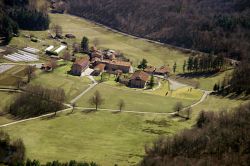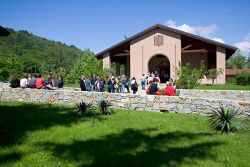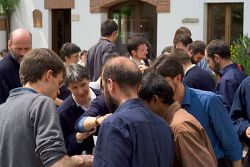On the edge of the desert
After this brief outline of the beginnings of the community, we can say a few words about how the community that has taken shape at Bose in the last thirty years understands itself as sharing in the monastic tradition.
The monks and nuns who have been present in the church from the first centuries have been men and women who, in order to live their Christian vocation as a radical commitment, have felt the need to seek solitude, to live at the margins of society and of the visible church, even at the cost of being marginalized. A monastery is usually in the desert, mountains, or woods... in one direction there is the city, at a reasonable but not extreme distance; in the other direction there is uninhabited space, silence and solitude. The monk looks toward the city and the church and remains in contact with them, never separating himself but expressing his complete solidarity through his prayer and intercession. He sometimes addresses a word or gesture to the city and church, or addresses them through his silence; but much of the time, in order to protect what has been entrusted to him, he finds it necessary to turn toward the desert, giving the impression that he has turned his back on the city and the church. But this turning away is in no way a gesture of disrespect: it is simply a sign of his thirst to return to God, in silence and attention.
Bose likes to calls itself a community on the edge of the desert: a community in which the treasure of silence and the possibility of listening to the Word are shared among the brothers and sisters, but also a community that seeks to be open, to welcome and listen to all, to share the joy and hope, but also the sorrow and distress, of all people.
The life of each brother and sister of Bose is centered on the service of praise offered to God in prayer, but also on service offered to others through professional work, hospitality offered to guests, travelers and pilgrims, and service offered to the church and to different Christian churches. According to the Rule of St. Benedict, the first thing to verify regarding someone who asks to enter a monastery is that he or she “truly seeks God.” At Bose, the community is also fully aware that it is only by walking in the footsteps of Christ, in service and in giving one’s life for all people, that it is possible to seek the true God, and not an idol.
Why on the edge of the desert, then? To listen to and to know the Lord, and at the same time to understand what it means to live a fully human life. The goal is love.
Brother, sister, you are no longer alone! In all things you should rely on your brothers and sisters. Love them, since God has given them to you as your primary guardians and companions, in the same way that Christ loved you to the end. Love this community, and with it and by means of it all people. Love all creatures, praise God for them, and try to find in them purification, instruction and consolation. You have been called to be a sign of the love that gives itself for others.
(Rule of Bose 2)
Love is the télos, the goal, of Christian life. It is for this reason that the way of life chosen at Bose has been, from the beginning, life in community: in the daily life of the monastic community, everything should be directed toward communion. The community owns everything in common, to the degree that this is possible, as an expression of the shared priority of the Word of God and as a way of making possible a sharing of life radical enough to become a sign of the communion of the Trinity, which opens outward to encompass everything in creation.


